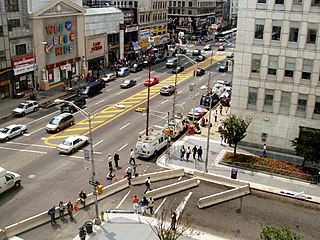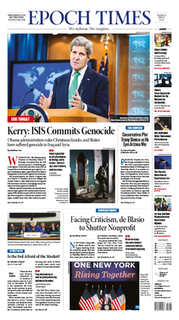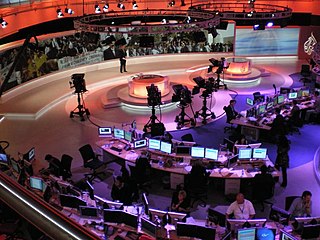Media of Venezuela comprise the mass and niche news and information communications infrastructure of Venezuela. Thus, the media of Venezuela consist of several different types of communications media: television, radio, newspapers, magazines, cinema, and Internet-based news outlets and websites. Venezuela also has a strong music industry and arts scene.
Communications in Barbados refers to the telephony, internet, postal, radio, and television systems of Barbados. Barbados has long been an informational and communications centre in the Caribbean region. Electricity coverage throughout Barbados is good and reliable. Usage is high and provided by a service monopoly, Barbados Light & Power Company Ltd..

Media of the United States consist of several different types of media: television, radio, cinema, newspapers, magazines, and Internet-based web sites. The U.S. also has a strong music industry. Many of the media are controlled by large for-profit corporations who reap revenue from advertising, subscriptions, and sale of copyrighted material. American media conglomerates tend to be leading global players, generating large revenues as well as large opposition in many parts of the world. With the passage of the Telecommunications Act of 1996, further deregulation and convergence are under way, leading to mega-mergers, further concentration of media ownership, and the emergence of multinational media conglomerates. These mergers enable tighter control of information. Currently, five corporations control roughly 90% of the media. Critics allege that localism, local news and other content at the community level, media spending and coverage of news, and diversity of ownership and views have suffered as a result of these processes of media concentration.
Concentration of media ownership is a process whereby progressively fewer individuals or organizations control increasing shares of the mass media. Contemporary research demonstrates increasing levels of consolidation, with many media industries already highly concentrated and dominated by a very small number of firms.
The Media of the People's Republic of China consists primarily of television, newspapers, radio, and magazines. Since 2000, the Internet has also emerged as an important form of communication by media, and is placed under the supervision of the Chinese government.

The news media or news industry are forms of mass media that focus on delivering news to the general public or a target public. These include print media, broadcast news, and more recently the Internet.
The Indian media consists of several different types of communications of mass media: television, radio, cinema, newspapers, magazines, and Internet-based websites/portals. Indian media was active since the late 18th century. The print media started in India as early as 1780. Radio broadcasting began in 1927. Indian media is among the oldest in the world. It dates back even before the reign of Ashoka. Media in India has been free and independent throughout most of its history. However, there have been periods when it was muzzled. The period of emergency (1975–1977), declared by Prime Minister Indira Gandhi, was the brief period when India's media was faced with potential government retribution. Many of the media are controlled by large, for-profit corporations, which reap revenue from advertising, subscriptions, and sale of copyrighted material. India also has a strong music and film industry.

Australia has a modern and diverse media industry spanning traditional and digital formats, and catering mostly to its predominantly English-speaking population. In 2018 the Press Freedom Index ranked Australia 19th out of 180 countries

The Epoch Times is a multi-language newspaper founded in 2000 by John Tang and a group of Chinese Americans associated with the Falun Gong spiritual movement. Though the newspaper is known for general interest topics with a focus on news about China and its human rights issues, it has become known for its support of U.S. President Donald Trump and favorable coverage of far-right politicians in Europe; a 2019 report showed it to be the second-largest funder of pro-Trump Facebook advertising after the Trump campaign. The newspaper is part of the Epoch Media Group, which also operates New Tang Dynasty Television (NTD). The group's news sites and YouTube channels have spread conspiracy theories such as QAnon and anti-vaccination propaganda.
CL Financial was the largest privately held conglomerate in Trinidad and Tobago and one of the largest privately held corporations in the entire Caribbean, before the company encountered a major liquidity crisis and subsequent bailout in 2009.

The media in Burkina Faso consists of print media and state-supported radio, news, and television stations, along with several private broadcasters with programs consisting of sports, music, cultural, or religious themes.
Swift Communications Inc. is an American digital marketing and newspaper publishing company based in Carson City, Nevada. Swift's primary markets are resort town tabloid newspapers and websites as well as agricultural publications. Swift Communications pioneered digital paywalls for newspaper websites, now an industry norm, long before its peers.

The mass media in Ethiopia consist of radio, television and the Internet, which remain under the control of the Ethiopian government, as well as private newspapers and magazines. Ten radio broadcast stations, eight AM and two shortwave, are licensed to operate in Ethiopia. The major radio broadcasting stations include Raido Ethiopia, Radio Fana a private station, Radio Voice of One Free Ethiopia, and the Voice of the Revolution of Tigray. The only terrestrial (broadcast) television networks are government owned and include Ethiopian Television and other regional stations. In keeping with government policy, radio broadcasts occur in a variety of languages including Amharic, Afaan Oromo, Tigrigna, and more. There are also many video sharing websites which are a popular way of getting information as well as entertainment in Ethiopia.
The media of Russia refers to mass media outlets based in the Russian Federation. The media of Russia is diverse, with a wide range of broadcast and print outlets available to the consumers. Television, magazines, and newspapers are all operated by both state-owned and for-profit corporations which depend on advertising, subscription, and other sales-related revenues. Even though the Constitution of Russia guarantees freedom of speech the country is plagued by both government and self-censorship. As a country in transition, Russia's media system is under transformation.
Media are the communication outlets or tools used to store and deliver information or data. The term refers to components of the mass media communications industry, such as print media, publishing, the news media, photography, cinema, broadcasting, and advertising.
The media of Afghanistan includes printing, broadcasting, and digital. It is mainly in Dari and Pashto, the official languages of the nation. According to the Attorney General's Office of Afghanistan, "there are 1,879 active media outlets in Afghanistan which are called as one of the main achievements of the country in the past 18 years."

News is information about current events. This may be provided through many different media: word of mouth, printing, postal systems, broadcasting, electronic communication, or through the testimony of observers and witnesses to events.

The media of Ghana, includes television, radio, internet publishing and newspapers.
Julian Ernest Chetvynde Rogers MBE is a Caribbean broadcaster and journalist. He has worked as broadcast manager, TV and radio host and producer, publisher, trainer, lecturer, media consultant and public relations professional. Involved since the 1970s with the building of national radio stations notably in Barbados, St Kitts & Nevis, and Antigua & Barbuda, and part of "the original team set up to 'revolutionise' the media industry in Trinidad & Tobago with the rebranding of the Trinidad and Tobago Television Company (TTT) into CNMG", he has been called "the Caribbean man" and has established a reputation as one of the region's most respected media practitioners. His characteristic style as a broadcaster is to conduct biting interviews; one commentator refers to "the persistent journalistic exploits of a resurgent, sharp-witted and emphatic Julian Rogers".
Various television networks, newspapers, and radio stations operate within Rwanda. These forms of media serve the Rwandan community by disseminating necessary information among the general public. They are regulated by an independent government body, The Media High Council, based upon statutes regarding the regulation of media in Rwanda established in the Constitution of Rwanda.







